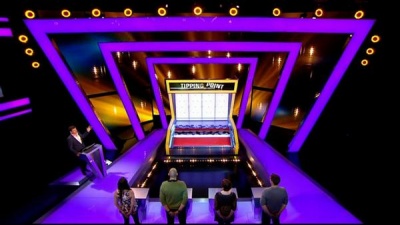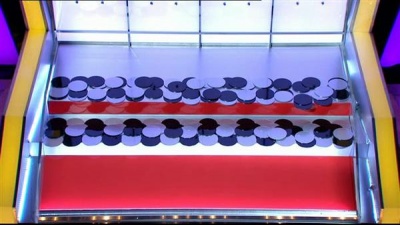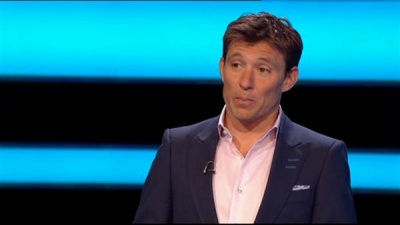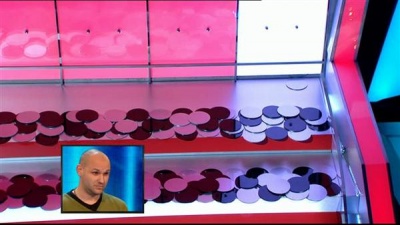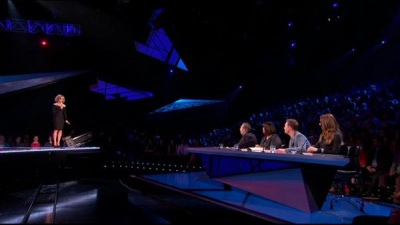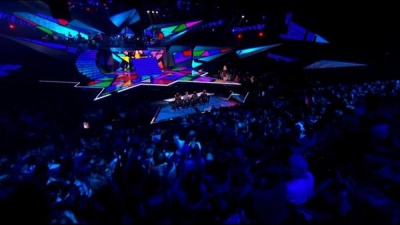Weaver's Week 2012-07-22
Last week | Weaver's Week Index | Next week
Have you worked out who is your favourite performer on Superstar? Lines are open until 7pm, so if you feel your mind wandering during the next programme, do pick up the phone and vote. It's the most important thing you'll do all day.
Contents |
Tipping Point
RDF for ITV, 2-27 July
The star of Tipping Point is a huge machine that takes in counters, and spits them out. Put the counter in at the back of the machine, and it pushes other counters around. Some of them might fall down to the next level, and so on down, and any that fall down out of the machine are awarded to the contenders. The concept is familiar to those of us who spent out youth in seaside arcades: the machines there took in every 2p piece we had, and every 2p piece it spat out went back in.
How is this going to turn into a game of skill and judgement? Players are able to insert their counters into one of four "drop zones", from where the counter will bounce around on some pegs in the path. It might roll to the left, it might roll to the right, it might come to a halt somewhere in the middle. The contender controls exactly when their counter gets released, hoping that it can be pulled a little way out and lie flat rather than land on top of an existing counter.
What's more, players only get to release a counter if they answer a general-knowledge question correctly. One question means one counter gets released. In the first round, four players are each issued with three counters. They're not physically given these counters, the players release their counters by pressing a button. They spend the whole game facing the machine, staring at its shelf, which advances and retreats like the tide.
Round one begins with questions on the buzzers. A wrong answer relieves the player of one of their counters, and puts it into a penalty pot, which will be resolved later. Give a right answer, and the player can put one of their chips into the machine. Or they can tell one of the other players to put something in the machine, a little tactical opportunity. Players use this if they believe the machine is not likely to pay out. It rarely happens on the first drop, the producers rig the machine so that it'll pay out something straight away.
Quickly, it becomes clear that Ben Shephard hasn't been employed purely for his ability to relate to players, and to keep cool under pressure – we already knew he could do these things. No, Ben's been given the gig because he's able to turn the most banal event into something worth watching. We're seeing plastic discs fall down onto a shelf, cause other plastic discs to shuffle about, possibly fall over the edge, and the process repeat on the next level down. Ben, bless his socks, provides a commentary on these droppings, gently cranking up the tension. It's a bravura performance, getting the viewer emotionally involved in this game of shuffle ha'penny. We are getting a slightly uncomfortable vibe from Ben's patter, constantly referring to the machine as "she", but only when it's being unhelpful and not giving out many tokens. Committing the pathetic fallacy is poetic license; being mildly sexist is avoidable.
Anyway, round one continues. Players drop out when they have no more counters in hand, and at least one question will be addressed to one player only. Then the penalty pot will come into play: every question answered incorrectly has resulted in one token dropping out of play, and they're all awarded to the winner of one final question. That player's able to drop them in, one after another, and might be able to progress some counters to all drop at once.
Every counter in this game is worth £50, but only the eventual winner can take any money home. Whoever has the lowest score after round one leaves with nothing. Round two is still one question for one chip, this time each player gets 30 seconds to build up their stock of counters and plays them all at once. The player in the lead has the option to take their questions first, or pass to one of their opponents; again, the slight tactics, but only slight because it's rare that four or five counters won't produce something useful. The lowest aggregate score after the opening two rounds leaves the game.
Round three is the head-to-head, three questions will be asked to each of the players. A right answer means they get to insert the counter: a wrong one gives the counter to the opposition. There's also an option to pass the question across to the other player, who again needs to give the correct answer to retain the counter. Nothing novel in terms of gameplay, and Ben explains this better than we did.
So far, the questions have been open, without any possible answers. They're moderately demanding questions, of the style "Which comedienne plays the title character in The Vicar of Dibley?"*. The viewer's question has three possible answers, and so do the questions in the final round. After inserting a jackpot counter in the machine (and taking any money that falls out) the contender is assigned six categories to choose from. For each category, they can pick a question worth one, two, or three counters, and of appropriately increasing difficulty.
The objective of the final round is to get the jackpot chip back out of the machine: if the contender can nudge it out, they'll win £10,000. If not, they're given £50 for everything they've retrieved during the game. During the game, channels have begun to open up, chains of counters running parallel to the sides of the machine. If the jackpot counter falls into one of these channels, we reckon that it could come out in as few as six counters, if the player is very very lucky. More usually, it'll take fifteen or more counters and still a slice of luck.
After playing all six categories, and assuming the jackpot is still in there somewhere, the player is offered a final offer: three more counters to extract the jackpot, but if they fail, they will leave with nothing. Only if the jackpot is right at the edge does this represent reasonable value. Otherwise, the player would be wise to take their winnings, typically somewhere around £2500.
Tipping Point is going out in the same slot as The Chase, and there are some similarities with the established programme. Four players, general knowledge questions, a host who very subtly shapes the programme by his presence. But they're different programmes at heart – Tipping Point is a solo game, The Chase a team effort, and Tipping Point's gimmick – its machine – might grow old quickly. As a summer filler, it's perfectly watchable, even if we have forgotten everything by the time the news comes on. Apart from which potential Jesus Christ Superstar we're voting for.
Superstar
ITV Studios for ITV, 7-25 July
It's back! The biggest and most fabulously self-important thing on television is again on television! The phone lines are open! The lighting is rigged!
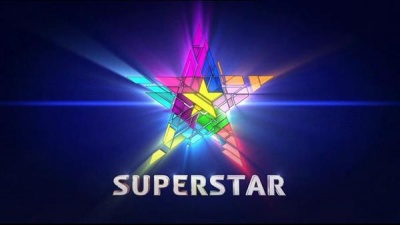 Welcome one, welcome all, to Britain's Got a Brand New Talented Jesus Christ Soapstar Superstar Strictly On Ice II+1!!!
Welcome one, welcome all, to Britain's Got a Brand New Talented Jesus Christ Soapstar Superstar Strictly On Ice II+1!!!
What? Peter Kay's 2008 programme was a spoof, and not actually a blueprint on how to stage a successful television talent show? You could have fooled us. You certainly fooled the ITV programme-makers, who have taken Britain's Got The Pop Factor* as gospel, or at least as The Revealed and Inerrant Word.
"And The Word was cancelled after five series. And The Lord didst make five casting shows, each more barking and full of itself than the last."
Superstar is seeking to find the title role in the new production of Jesus Christ Soapstar Superstar* (original recording, remastered), to be performed in a big draughty tent pitched on top of the Blackwall Tunnel, and starring that well-known musical performer Chris Moyles and that erstwhile radio presenter Melanie "Mel C" Chisholm. Miss C is on the critical panel, and is actually critical of some of the performances. But more of that later.
Superstar followed the traditional route for these shows: lots of people audition before the judging panel, some of them are called back for further auditions, and some of them are sent on to sing in southern Spain, for no obvious reason. The show's sponsor, Andrew Lloyd Webber, is missing for much of the audition process, and contributes only through pre-recorded video inserts.
Eventually, the performers are brought back to Blighty, on an all-night coach trip. According to Mr. Lloyd Webber, this is meant to replicate life on a touring show, where the planning is so slack that they'll need to sleep while the coach travels from Aberdeen to Plymouth, and do the same when it goes from Plymouth to Carlisle the following week. Never mind the carbon footprint, feel the challenge.
We mentioned the judging panel earlier. It includes Melanie C. It doesn't include Chris Moyles; the Big Blackwall Tent is large enough to host Mr. Moyles and Mr. Lloyd Webber's egos, but the studio is not. Also on the panel is Mr. Jason Donovan, a well-known heterosexualist from Australia and performer of such vocally-challenging classics as "Too many broken hearts". For the live programmes, Dawn French bowls up, purely because she once played a vicar in a sitcom. Do the ITV producers think that the ITV viewers will confuse a fictional role with real life? Are they right?
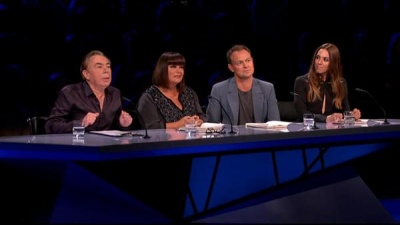 The panel: Lord Lloyd-Webber of Sydenham, the Vicar of Dibley, the lemon-juice hair-stylist, Sporty Spice.
The panel: Lord Lloyd-Webber of Sydenham, the Vicar of Dibley, the lemon-juice hair-stylist, Sporty Spice.
There's an off-screen voiceover, full of puns about careers being resurrected, and stones being rolled away, and feeding the five thousand, and doubtless will go on to discuss raising the dead while leading the lame. The same anonymous, anodyne voice gives the phone numbers, and eventually the results.
As with every Lloyd Webber show, the result of the vote-off is a jaw-dropping spectacle. For starters, it's the start of the programme, based on phone votes cast the previous night. "You have been saved by the Lord (Lloyd-Webber), please take your place on the stairway to heaven." It makes us wonder. So does the choice of Battle Round song: in the elimination we watched, it's "Memory" from Cats, which we associate with the voice of Elaine Paige, not the tenor of these gentlemen. As in The Voice's battle rounds, the crowd goes ballistic whenever anyone raises their voice beyond a whisper, but at least we don't come away with the feeling that the two performers are trying to out-shout each other.
So, that's the opening segment, how can they follow that? Have the eliminated contender walk into the light. Chr —— crikey, they are trying to set new records for minor blasphemy and religious frivolity. It wasn't "boot camp", it was "sandal camp". See what they did there? (We did, incidentally, attempt to make contact with our divine mate Perry Fripp, the mezzanine-level deity of game shows, but prayers were not returned before our deadline.)
The show will also set new records for the number of people in the top ten, putting eleven there. Officially, this is because Mr. Lloyd Webber doesn't know whether the eleventh man is good enough. Let's be honest, it's to set up a narrative through the series, giving the public an extra reason to root for (or against) one of the players. And it's a reason not to give gratuitous offence, because if there had been twelve, one of them would have been wearing the Team Judas hoodie.
The contenders include David. Who's David? Not the one from Busted, but the one from Reverb, who supported McFly, who themselves supported Busted. There's Dirk, ticking the Scottish box. He's singing "Make you feel my love," a Bob Dylan original, made famous by Adele, and now being performed by a bloke. Gender confusion a-hoy!
Then there's Nathan, performing a sweet soul number and being called "sexy" by Jason Donovan (an infamous heterosexual, as demonstrated in court some years ago). He's told, "You have a god-given rock voice" by the Lord, and the Blasphemy Police break out another bottle of green ink. R Ben doesn't get back to Tyneside as often as he'd like, and performs an arrangement of "Baa baa black sheep" with different words.
Britain's Got a Brand New Talented Jesus Christ Soapstar Superstar Strictly On Ice II+1!! has done a lot of things right: there's a live band (as we've seen on The Voice), the critical panel complain that things are "pitchy" (as we've seen on The Voice). The stage is a video floor and wall, like almost every Eurovision Song Contest in recent years. Whenever anyone says anything remotely critical the crowd boos and jeers as though they were being paid by the shout (as we've seen pretty much everywhere), and the host isn't seen on stage (as Reggie Yates was on The Voice).
And the singing goes on. And on. Niall, a lifeguard from Northern Ireland, has a modern soft-rock anthem. Dawn French compares him to Lee Mead (from Any Dream Will Do), and points out that he married one of the judges. Hint. Jeff is the Baby Jesus, Rory the token Welshman. "If you want Ben to be your personal Jesus" goes the host at one point, and the Depeche Mode fans break out another bottle of purple eyeliner.
If there's one thing we'll remember from Britain's Got a Brand New Talented Jesus Christ Soapstar Superstar Strictly On Ice II+1!!, it's the way it took the line in the sand between "men's singing" and "women's singing", and didn't so much blur it as dance upon it until it was completely erased. (Sisco Gomez does the choreography, the best thing about the programme.) Roger, who was once Simba in "The Lion King", performs "A whiter shade of pale", made famous by Procul Harem, and covered by Annie Lennox. Tim from Birmingham is going to sing Paloma Faith (as we've seen on The Voice). Jon the understudy draws a Kelly Clarkson number, Afnan the pole dancer gets Emeli Sandé's big hit. Geraldine McQueen was a comedy character, and not a terribly funny one, but there's a more substantive point being made here. There aren't women's songs and men's songs these days, there are songs made famous by men and by women. Would Mr. Lloyd Webber have dared considered a woman for Jesus?
But the killer question: are we enthused by the programme? We're not: we have no particular desire to go to the arse end of London and pay far too much money to see these performers. If we're going down the arse end of London, it's got to be for performers we really like, and none of these cut it. The unusual voting system is novel, we suspect it's done to ensure the largest voting window possible and to ensure the eliminations don't run on past the News at Ten Thirty. It does mean that the programmes end on a complete anti-climax. "Keep voting" says the voice-over. "You must engage," goes one of the lyrics from the show, but we're not engaged.
This Week And Next
Didn't University Challenge return this week? Yes, it did. And we watched it, and we're going to talk about it in a moment. But we're not going to write a full report. We've watched and reported on every show for the past eleven series, and the Reunited series, and there's only so much we can say about UC without completely repeating ourselves. We will watch, and note, and will give the traditional full reports from the start of the group phase.
Heat 1 was between Trinity Laban and York. The former is a college of music and dance, and is making its début in the contest; the latter is famed for its production of ducks and hitch-hikers, and finished runner-up a couple of years ago. It was a slow-scoring start, with more starters beating the teams than answered correctly, and a painfully slow audio round featuring bands with a member in common – this couldn't sensibly be interrupted before the second clip was played.
Stereotype-buster of the show came when a question about the liberation of electrons from a chlorine atom was answered by the dancer from Trinity Laban. The lead changed hands a lot, and neither side ever gathers much momentum before York pulled away in the closing five minutes, aided by questions on acute and reflex angles. Wasn't that primary school work? The final score of 185-105 flattered York a little: this was far from a classic match.
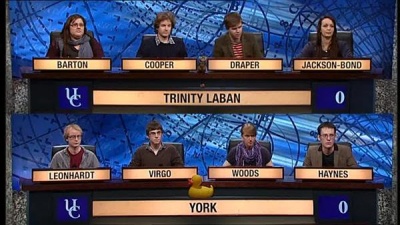 Trinity Laban: Claire Barton, Diccon Cooper, Sam Draper, Amber Jackson-Bond
Trinity Laban: Claire Barton, Diccon Cooper, Sam Draper, Amber Jackson-Bond
York: Alex Leonhardt, Robin Virgo, Rebecca Woods, Edward Haynes.
Returning to casting show news, and we learn that Sam Buttery from The Voice UK has been cast in "Taboo". The musical was written by Boy George, and Mr. Buttery will be taking over a part originated by Mr. George.
BARB ratings in the week to 8 July are now out. We don't care for transient overnight ratings, not when we've got the reliable, full-sample ratings, including people who time-shifted the programmes for later consumption. Though we doubt many of the 11.5m people who watched the Wimbledon final will have done that. Top game show was Secret Fortune, 4.15m. Jesus Christ Soapstar Superstar had 3.15m for its Sunday audition, and Let's Get Gold finished third, with 2.5m viewers. Tipping Point made its debut here, the 2.2m viewers equals the audience of Mock the Week. Big Brother had 1.85m, and Come Dine with Me led Channel 4 on 1.75m.
The tennis did have an effect on the ratings: none of More4's Sunday Come Dine with Me beat 300,000 viewers. That leaves Hell's Kitchen Us as the top digital channel show (580,000), with Dave's repeats of HIGNFY (415,000) and Would I Lie to You (390,000) coming second and third. Good score for Ninja Warrior on Challenge, 145,000 on Monday teatime.
A certain smell of sport about the schedules: Dancing on Ice Goes Gold (ITV, 8pm Sunday), Superscot Sports Special (BBC Radio Scotland, 2pm Monday), and The Big Quiz (2) goes sporty (ITV, 9pm Thursday). All this because the UK is dreading the worst thing that can possibly happen during the year: a new series of Quote... Unquote (Radio 4, 3pm Monday). Superstar finishes on Wednesday (ITV), and next Saturday night has us trying to find something more attractive than The Million Pound Drapp With Celebrities (C4, 7.25) and Big Brother (C5, 9pm). And failing.
To have Weaver's Week emailed to you on publication day, receive our exclusive TV roundup of the game shows in the week ahead, and chat to other ukgameshows.com readers, sign up to our Yahoo! Group.

